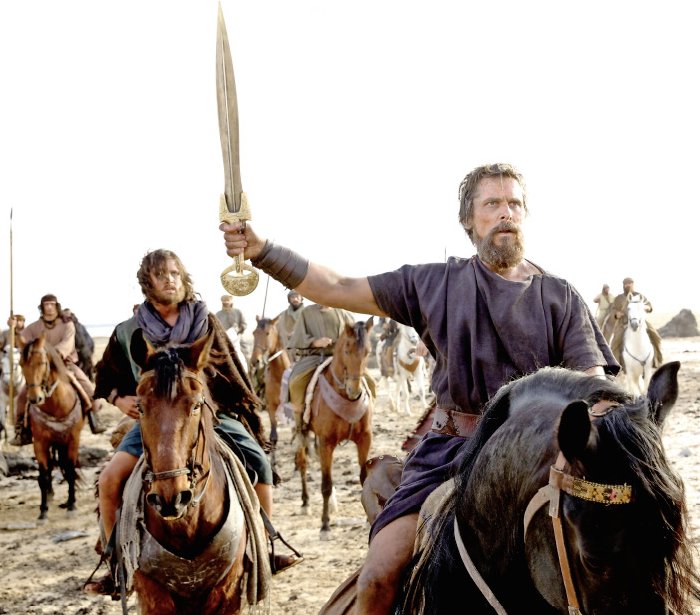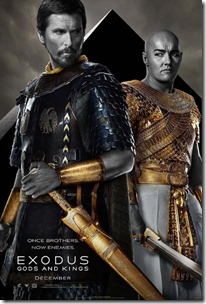 EXODUS: GODS AND KINGS is the latest biblical epic to come out this year. It’s from Ridley Scott, who knows how to do ancient epics (Gladiator, anyone?), so I had high hopes. Despite some provocative interviews and controversies, it didn’t generate near the controversy NOAH did (I’m not sure why).
EXODUS: GODS AND KINGS is the latest biblical epic to come out this year. It’s from Ridley Scott, who knows how to do ancient epics (Gladiator, anyone?), so I had high hopes. Despite some provocative interviews and controversies, it didn’t generate near the controversy NOAH did (I’m not sure why).
EXODUS isn’t nearly as good as NOAH. It’s surprisingly dull, leaving out some of the best bits of the biblical narrative – ostensibly so we focus more strongly on Moses, or maybe for time, but either way, the film doesn’t offer many surprises. Too many ideas were teased and never developed.
I was left with the sense that the writers just weren’t sure what sort of story they wanted to tell.
That’s understandable – the Exodus is one of the most important events in world history, and even though the events comprise less than 20 chapters of the Bible, there’s so much packed in and implied, it could easily be a trilogy (and can we all be grateful Hollywood didn’t get that idea?!). But it’s always better to tell one story well than several poorly, and EXODUS could’ve used some focus.
I was impressed by how conservative the film was. Though many scholars today dispute the historicity of the Exodus, the film doesn’t shy away from thousands of Hebrews descended from Abraham leaving Egypt under Moses’ leadership after 10 plagues. EXODUS walks a line between demythologizing the Exodus story and affirming its historicity I found fascinating.
EXODUS isn’t a great film. That said, it’s not all bad. Here are 5 things I loved and 5 things I didn’t love about EXODUS: GODS AND KINGS.
If you can spoil a movie like EXODUS, spoilers after the jump!
5 things I loved about EXODUS
1. Moses
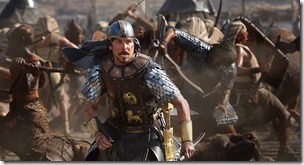 Not everyone has been a fan of Christian Bale’s portrayal of Moses, but I enjoyed it. He plays Moses as a tough, practical man raised in Pharaoh’s house but not of Pharaoh’s line — in the film, he’s the (adopted) son of Seti’s sister-in-law. Bale’s Moses is laughably modern: he thinks religion is dangerous superstition that leads to fanaticism. He’s a natural leader and a fierce warrior.
Not everyone has been a fan of Christian Bale’s portrayal of Moses, but I enjoyed it. He plays Moses as a tough, practical man raised in Pharaoh’s house but not of Pharaoh’s line — in the film, he’s the (adopted) son of Seti’s sister-in-law. Bale’s Moses is laughably modern: he thinks religion is dangerous superstition that leads to fanaticism. He’s a natural leader and a fierce warrior.
I particularly enjoyed Moses’ relationship with Ramses (whose portrayal by Joel Edgerton was one of the best in the film, despite his super-whiteness). They’re played (as has become popular) as cousins who grow up as close as brothers. Moses has no desire for the throne, and is therefore better-suited than Ramses, who becomes jealous and paranoid. I didn’t mind how they tweaked the events that led to Moses’ exile, especially because it heightened Moses’ sense that he didn’t belong anywhere.
Bale did a good job with Moses, despite the little he had to work with from the script.
Bale’s Moses is a man without a country – he’s always known he’s not royal blood, but when he learns he is actually a Hebrew, his longing becomes more acute. He finds a home with Zipporah, but is called away when God sends him back to Egypt. EXODUS: GODS AND KINGS is more-or-less a character study of Moses, and Bale carries it well.
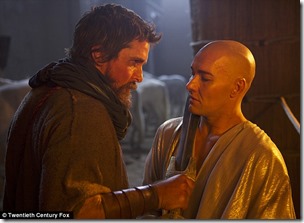
Doubtless the most controversial point for people of faith will be how Bale chooses to portray Moses. He’s the consummate cynic until he’s chasing some sheep up Mt. Sinai/Horeb. He’s nearly killed in a rock slide, and only after he’s hit on the head does he have these visions of God’s call. (The burning bush scene was one of the most disappointing in the film for me. It was beautifully done, and had a great creepy vibe, but I really wanted to see some leprosy or snakes).
After Moses’ “incident”, he is a very different person – he goes from cynic to fanatic. To Scott’s credit, he uses all this to make some fascinating commentary on contemporary politics. But this portrayal of Moses as a religious fanatic who might be insane echoes Russell Crow’s Noah, which might just be an indication of how uneasy we are these days with people who claim to hear from God. (Though maybe it’s not just us – people thought Jesus was demon-possessed!)
I actually really enjoy how EXODUS portrayed Moses. I enjoyed wondering if maybe the guy was a little unhinged, a little too fanatical. I would’ve been much more bothered had the film come down hard on that side. But it didn’t. In fact, quite the opposite:
2. EXODUS doesn’t shy away from miracles
Let’s be real: you watch EXODUS for the 10 plagues and the Red Sea crossing. If like me you felt cheated that the animated Prince of Egypt reduced the plagues to a musical montage, fear not! Scott unleashes them in all their horror. Again, some key differences: Moses doesn’t arrive with a clear mandate and roadmap from God as he seems to in the Scriptures. In fact, Moses takes it upon himself to lead the Hebrews in guerrilla warfare until God gets tired of waiting for Moses and takes matters into his own hands.
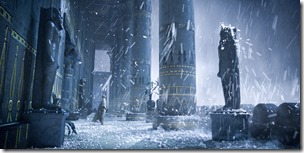
When they plagues begin, they’re one after another, without the scenes of Ramses hardening his heart after a confrontation with Moses between each plague. And in theory, each plague is a natural disaster. The Nile turns to blood after all the crocodiles go crazy. The frogs are driven out of the Nile by the blood, and then after the frogs and fish die, the flies are birthed from their rotting carcasses. The flies then spread disease to the people and the livestock…
And if you’re starting to think that all sounds a little far-fetched, you’re right where the film wants you. Even before the Angel of Death visits, the film comes down hard on the side of the supernatural. After the livestock start dying, the Egyptian scientist tries to explain yet again how all these troubles are due to perfectly explainable natural phenomena. He falters, seemingly unable to convince even himself, and the next scene shows him being hanged.
This anachronism is clearly on purpose. Scott wants us to know without a shadow of doubt these plagues are divinely sanctioned.
If there was any doubt, the visit from the Angel of Death should silence them. Moses receives clear instructions from God, and if it’s only a hallucination, it’s the most trustworthy hallucination of all time. That night, after the slaughter of the lambs for the first Passover, a shadow descends on Egypt. The light in every home that’s not covered by lambs’ blood is extinguished, along with the life of the firstborn boy.
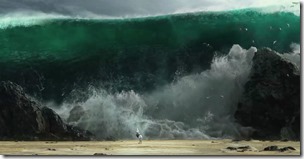
When Ramses confronts Moses, Moses assures him: “Not one Hebrew child died.”
That’s unquestionably supernatural. Even if the Red Sea crossing ended up being possible because of a tsunami (which EXODUS seems to indicate), the timing of the tsunami strains the bounds of what can be considered natural. I enjoy how the film placed most of these on the line between natural and supernatural, then slightly shifts the scales to the super-natural.
3. EXODUS doesn’t shy away from God’s violence
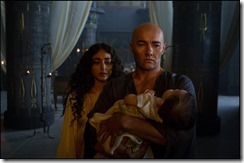
The visit from the Angel of Death was hard to watch. Scott captured the horror of the event, as mother after mother woke to find her child dead, and Moses’ face as he listens to the wails that arise all over Memphis is agonizing.
God in EXODUS is rash, impulsive and temperamental. I don’t love this portrayal of God (more on that below), but I appreciate that Scott is trying to deal seriously with the story we have: this is a violent, bloody story where babies die. It’s not easy to church-up, and Scott doesn’t try. He lets the problems in the biblical text be problems in the film.
4. Egyptian and Hebrew culture are depicted (fairly) well
The effects weren’t perfect, but it was so cool to see Memphis in its glory, and how Scott chose to realize Egyptian culture. The religions, even how the Egyptian army used their various gods to label their divisions (so in that first battle with the Hittites, Ramses is giving orders to the Ra division, the Set division and so on). And Scott allows that the Egyptian gods are active and powerful in some ways – the high priestess makes an accurate prophecy at the beginning of the film.
The Hebrews are similarly interesting. Moses tells us “Israel” means “wrestles with God” (which Moses then does for the latter half of the film). When Nun (Joshua’s father) tells Moses the story of his birth, Moses storms out in a rage, spitting, “And you people are supposed to be story-tellers.” They long for Canaan. And the all-too-brief conversation between Moses and Joshua after they cross the Red Sea hints at the politics Israel will face when they arrive in Canaan.
Maybe because the film was so Moses-centric or maybe because it was made for an American audience, we still didn’t get to see how communal ancient cultures were compared to ours today. So after Moses and Zipporah marry, we barely see anyone else from Jethro’s house, even though Moses would’ve lived with him as one of his shepherds and sons-in-law. It’s a little better in the Hebrew city, but it could’ve been more explicit.
Biblical archaeology has come a long way since Charlton Heston and Cecil B. DeMille, and I thoroughly enjoyed seeing both Egyptian and Hebrew culture realized to the extent they were.
5. Power, privilege and class
I’ve seen several people complaining about the anachronisms in the film, but I read them as Scott’s commentary on the continuing relevance of the Exodus story. While plenty of people want to make Exodus into the blueprint for democracy, Scott reads Moses as a terrorist freedom fighter. He’s opposing the government, working for the powerless, and using violence to do so. Bale observed that if EXODUS were set today, Moses would have drones sent after him, an observation that might be troubling for many of us in power who look to Moses as a hero to emulate.
Scott uses the clash of gods as a backdrop to explore oppression and power to great effect.
EXODUS also warns about the danger of privilege.
Without excusing the violence of the Angel of Death, EXODUS critiques Egypt’s violence. In the midst of the 9th plague – darkness, Ramses vows he will kill every Hebrew child that’s not able to walk yet. He declares, “Let’s see who’s better at killing. Me. Or your god.”
Seemingly in response, God unleashes the Angel of Death before Ramses can enact his plan. In his confrontation with Moses, when he kicks the Hebrews out of Egypt, Ramses spits,
This is the god you worship? The killer of children?
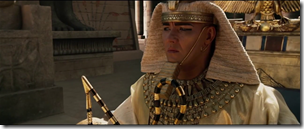 A fair point, but Ramses seems oblivious to the fact that before his son died, he had declared himself to be a god, and was planning to kill children. He isn’t mad at the character of Israel’s god; he’s mad that “I AM” actually is better at killing than he is.
A fair point, but Ramses seems oblivious to the fact that before his son died, he had declared himself to be a god, and was planning to kill children. He isn’t mad at the character of Israel’s god; he’s mad that “I AM” actually is better at killing than he is.
Ramses is unable to see this about himself because of his privilege. He is at the top of the pyramid of power in Egypt, so he assumes his will is unassailable and inevitable. He’s convinced himself he is in fact a god. His confrontation with I AM leaves him broken, flailing and lashing out.
Those of us with privileged status or some measure of social standing would do well to note Ramses’ fall. It’s a warning to those in power, as surely as was the original Exodus story.
5 things I didn’t love about EXODUS
1. God is portrayed as a child.
I don’t mean only that God’s messenger is played by a child actor – who does great, by the way. I mean that I AM is portrayed as petty and childish. He throws tantrums. I didn’t mind that God seems surprised at points, able to plan and respond according to what humanity does. I enjoyed his back-and-forth with Moses while writing the 10 Commandments.
The film seems to suggest that the god of Exodus is an immature deity, one who has some growing up to do, who will mellow by the time we get to the New Testament and not be quite so filled with tween angst. That’s certainly a position many contemporary theologians are willing to take, but it does a profound disservice to the text itself, and to the peoples of that text. In Scott’s approach to God are the seeds for belittling Judaism as a primitive religion.
Had Scott chosen an adult actor to play the messenger, this could’ve been mitigated. I’m not sure what else he could be saying by casting a child as God.
And by the way, I loved the ambiguity surrounding the kid. Is he God? God’s messenger? It’s unclear, and equally unclear in the Biblical text. Very cool.
2. Moses’ family doesn’t accompany him.
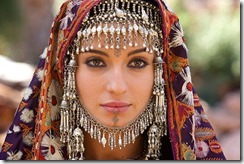 In the Bible, Zipporah and their son accompany Moses to Egypt. In EXODUS, they stay behind, mostly it seems for the sake of Moses’ character arc. It’s not because I demand strict literalism from my biblical epics. Really I just wanted to see that crazy scene where God tries to kill Moses because his son isn’t circumcised. With all the movie’s emphasis on Moses’ journey to accept his Jewishness, that could’ve been a pivotal scene. I’m sad it was left out.
In the Bible, Zipporah and their son accompany Moses to Egypt. In EXODUS, they stay behind, mostly it seems for the sake of Moses’ character arc. It’s not because I demand strict literalism from my biblical epics. Really I just wanted to see that crazy scene where God tries to kill Moses because his son isn’t circumcised. With all the movie’s emphasis on Moses’ journey to accept his Jewishness, that could’ve been a pivotal scene. I’m sad it was left out.
3. That mostly-white cast
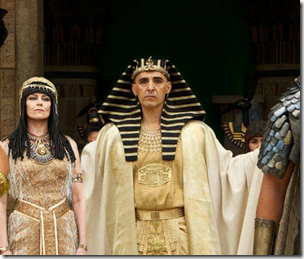
Scott’s taken a lot of heat for this, and his justifications aren’t cutting it with most critics. I don’t have anything to add. Most of the cast did great, especially Joel Edgerdon as Ramses. There were plenty of important minor roles that could’ve been given to non-white cast.
If the casting was intended to heighten the commentary on power and class, I would’ve been all for it, and frankly I got some of those vibes anyway. I was deeply uncomfortable watching white Egyptian armies destroy black Hittite armies, and black slaves serving white masters.
But Scott never mentions that this is on purpose, which makes me even more uncomfortable. If it was merely an oversight, it’s a huge problem with the film, and one I’m glad is being addressed.
4. Moses vs. Ramses
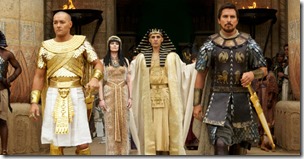 I’ve already mentioned how much I enjoyed the relationship between these two, and how well they both acted their parts. What I didn’t love is that their relationship was the core of the film. The Exodus is about God freeing and establishing Israel as a nation. It’s a showdown between I AM and the gods of Egypt, of whom Pharaoh is the earthly embodiment.
I’ve already mentioned how much I enjoyed the relationship between these two, and how well they both acted their parts. What I didn’t love is that their relationship was the core of the film. The Exodus is about God freeing and establishing Israel as a nation. It’s a showdown between I AM and the gods of Egypt, of whom Pharaoh is the earthly embodiment.
EXODUS had elements of that, but they were little more than teases. I wanted to see this more explicit. I wanted Moses vs. Pharoah’s whole court, magicians, priests and all. I wanted to see Moses’ staff, a key element in the Exodus story, but Moses leaves it with his son, something Scott surely did on purpose.
But why? The film isn’t clear. In the end, that’s why the story suffers. By teasing so much but not committing, EXODUS ends up not saying much, other than “Playing God will probably drive you crazy.” It might be a morality tale about power, except that Moses ends up fine.
5. The story of Israel is only teased.
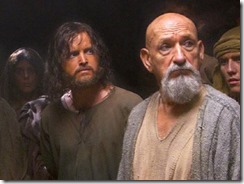
Again, this is not a movie about GODS AND KINGS, whatever the subtitle says. EXODUS is all about Moses. The climactic Red Sea events ends not with Israel crossing safely, but with Moses and Ramses swallowed in the sea, and Moses emerging without his Egyptian sword. His Egyptian identity has died and he’s been reborn (baptized?) wholly Hebrew, as he announces when he’s reunited with Zipporah.
The rest of Israel’s story is an afterthought. We get glimpses of the 10 Commandments, the Golden Calf. The Ark of the Covenant. Aaron and Miriam are marginal characters at best. The conquest of Canaan and Joshua’s role as Moses’ successor is hinted at, but not delivered. This is because EXODUS is not Israel’s story.
The final shot of the film is Moses, finally at home in the center of his people, the Ark of the Covenant beside him, God still tantalizingly at the margins of his life. This is the last shot because this has been Moses’ story from the beginning.
The Exodus isn’t Moses’ story. It’s Israel’s story. It’s God’s story. By focusing in on one person, no matter how powerful, influential and interesting that person is , Scott missed the real beauty and power of the Exodus.
But we did still get a decent movie.

